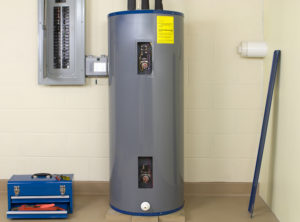Required Guidelines for Homeowners Handling Broken Heating Units
Required Guidelines for Homeowners Handling Broken Heating Units
Blog Article
We've come across this post pertaining to Maintaining & Draining a Water Heater directly below on the internet and reckoned it made sense to discuss it with you in this article.

Whether it is located in the cellar or a separate room, broken hot water heater can create stress and anxiety. A standard device holds 80 gallons, so an over night leak will certainly result in a flooding. This results in significant building damage with drenched walls as well as floorings. Besides, having no hot water supply is additionally troublesome. If you are dealing with these problems, keep in mind of the following:
Shut Down Power Source
Prior to calling the plumber, closed off a gas water heating unit by turning the temperature dial. This will prevent electrocution, especially if there is a leak as water is a conductor. Normally, the home heating component closes off when the water hits a certain temperature level.
Cut Off the Cold Water Supply
Cut off the tanks faucet water supply from the resource. This goes from your major water line right into the storage tank. When your tank is in good condition, the cold water quits filling when the tank is complete. Yet because it is leaking, the water will certainly continue to move. Close the shutoff found on top of the heating unit. Revolve this clockwise to close it off. If you can not find it or reach it, you have to shut off that major water system line outside your residential property.
Call the Plumber
After doing the initial 2 security actions, you need to call your plumber to come right away to repair a fractured water heating unit. There are generally indications that your aging water heater has sediment build-up in the interior.
Do not await significant flooding to call the plumber. By then, you will need to invest more to restore your building. Instead, as quickly as you spot these indications, have an expert involved evaluate your hot water heater say thanks to. Normally, water heaters have a lifespan of concerning 8 to 12 years. With routine evaluation and upkeep, you can prolong its life.
Tidy up Home
After calling the plumber, document damages by taking notes and photos so you can claim your property owner's insurance policy. Get rid of any standing water to stop mold as well as mildew growth. If you have a completely submersible water pump, utilize that to drain pipes the water.
Keep in mind, if you discover any kind of problems with your hot water heater, call the pros as soon as possible. You can not take this problem gently because a malfunctioning thermostat can elevate water temp to an alarmingly high level, bring about unintentional burns. A broken heating system stress safety valve can likewise trigger a surge. For finest results, get a yearly check so your system gets inspected, cleaned, drained pipes, and also replenished, guaranteeing ideal efficiency.
Whether it is located in the basement or a different room, damaged water heaters can trigger stress. Before calling the plumber, closed off a gas water heater by turning the temperature level dial. After doing the initial two safety and security steps, you have to call your plumber to come right away to take care of a fractured water heater. If you have a submersible water pump, utilize that to drain pipes the water. Remember, if you observe any type of concerns with your water heater, call the pros right away.
Is My Water Heater Broken?
The Water Heater is Old
No appliance will last forever. This includes a home’s water heater. During its lifespan, residents are going to face a situation where a new water heater installation will be necessary. The biggest problem with this is that most people are not sure when their water heater expires. Not knowing this can lead to serious risks if the unit begins to act up due to old age.
Most makes and models of water heaters will last between eight and 10 years. While 10 years is the age when water heater replacement is highly recommended, the need to replace the unit may occur before this time or after. If the unit doesn’t show any symptoms of a problem, it is a good idea to replace it at the 10-year mark (from the manufacture date).
Some of the symptoms that indicate a new unit is needed include rusting, leaks, noises, and a failure to heat up the water. Also, note that not all units have a 10-year life expectancy. The main exception to this rule is that a gas unit will last for six to eight years.
Rusty Heater Inlet Valve or Water
While steel is the strongest material on earth, it does have a weakness – rust. If corrosion occurs on a steel surface, it will begin to spread and eat through the steel in certain areas. On water tanks and pipes that are made of steel, rust is a warning sign of an impending leak.
The issue for many is trying to figure out if the rust is coming from the water heater or the pipes that lead to the faucet. If rust is seen, it is a clear indication that water heater service from the professionals is needed.
If rusty water appears out of the faucets in the bathtub or sink, it likely means a rusty water heater. If there is rust near the water inlet or the pressure relief valve, rust has likely developed inside the tank. If tap water appears rusty, it may be an issue with the pipes.
Strange Sounds from the Water Heater
Are there strange sounds coming from the tank? As a water heater gets older, rumbling noises may develop and get louder and louder as the water in the tank heats up. In homes where large amounts of hot water are used, the issue is likely going to be even more obvious when more serious issues arise. If there is a strange or loud noise coming from the unit, it is probably because of sediment buildup. A good way to remedy this problem is by flushing the heater. If this does not work, then a new unit may need to be installed.
Leaks
As a water heater gets closer to the end of its useful life, there is a higher chance there will be water around the tank. If there is water, this usually means leaks are occurring. Based on where the unit is located in the home, a leak may result in serious property damage.
Leaks are usually caused by expansions in the metal tank. The expansions occur as time passes and as the inside body of the tank is exposed to multiple heating cycles per day. When a fracture forms, the gap will be slight enough to hold the water in; however, in more serious situations, this will not be the case. If the tank is idle, the water will not leak but when the metal expands during each heating system, small amounts of water will get through the gap.

Do you like reading up on Water Heater Repair? Try to leave a short review down the page. We would be delighted to listen to your views about this content. In hopes that you visit us again in the future. Are you aware of someone else who is involved in Maintaining & Draining a Water Heater? Take a moment to promote it. Thank you so much for your time spent reading it.
Efficient, reliable plumbing services here. Report this page